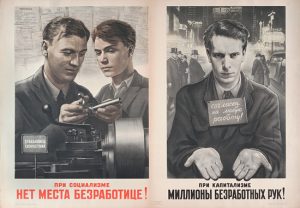
Viktor Koretsky, “Under Socialism, there is no place for unemployment! Under capitalism, there are millions unemployed!” (1950 Soviet poster)
By Grant Collins
On Monday, November 7th Dr. Steven Marks, an alumnus of Miami University and Professor of History at Clemson University, presented his lecture The Soviets’ “Gift” to America: The Word “Capitalism” as the sixth and final speaker of the Havighurst Center’s Colloquia Series: Russia in War and Revolution. Dr. Marks argued that, “in the United States, the mainstream understanding of Capitalism is conditioned by fear of communism”.
Dr. Marks began his lecture by stating that the first President to use the word “Capitalism” was Herbert Hoover who claimed that it was a socialist term. In fact, the term “Capitalism” originated within Imperial Russia during the 1870’s as a non-Marxist socialist term. In that context, it still is of relatively recent vintage and was used in a negative sense: populists feared “capitalism” was destroying traditional Russian villages. In his research, Dr. Marks ran keyword searches of periodicals and Presidential writings and found that when the word “Capitalism” appeared Russia was referenced nearly every time. Furthermore, according to world economic textbooks from the 1930’s to the 1990’s only two economic systems are referenced—Capitalistic systems such as the United States or Communist systems such as the Soviet Union’s. These findings support Marks’s notion that “Capitalism is seen as an alternative of the Russian model with no room in-between”.
The United States’ understanding of Capitalism and Communism as ideological opposites has had implications on U.S. policy and public opinion. In his recent book, The Information Nexus, Marks wrote that, “conservatives critiqued both socialist and New Deal proposals on the grounds that they would interfere with the laws of nature,” thereby supporting the notion that, “any tinkering with the system (capitalism) and you will have communism” (26).
During the Cold War a massive public relations campaign coined the idea of “People’s Capitalism” where the goal was to illustrate a new form of capitalism in order to re-sell the ‘American System’ by pitching that People’s Capitalism. Marks wrote that this effort “comes closer than any previous society to achieving man’s age old goal of the good life for all,” (The Information Nexus, 29). Although President Eisenhower did not like the term, the People’s Capitalism campaign targeted schools, churches, and barbershops in an attempt to fight the suspected global threat of Communism.
By the 1970’s the U.S. economic growth began to slow—this stagnation gave rise to the Libertarian movement. Ayn Rand, a Russian-Jewish immigrant, is one of the most influential Libertarian authors. Dr. Marks stated that Rand believed, “if Capitalism has any government involvement then it is communism”. This divisive view of Capitalism and Communism with regards to government involvement still has implications on policy to this day. For instance, President George H.W. Bush stated that Capitalism builds upon human nature and Communism does not in reference to the collapse to the Soviet Union in 1991. The fall of the Soviet Union solidified the notion in the minds of many that Capitalism, the exact opposite of Communism, had been successful and therefore all actions that are considered “anti-Communist” are warranted such as deregulation and resisting government increased involvement within the economy.
In the 2000’s, with the collapse of the U.S. economy, President George W. Bush still referenced only two economic systems when comparing the United States to the former Soviet Union. Allan Greenspan, former Chairman of the Federal Reserve said that his, “entire intellectual edifice has collapsed,” following the U.S. housing crisis. Greenspan was a supporter of Ayn Rand and “Capitalistic” economic theories that advocated for deregulation and reduced government involvement. However, the belief of letting “the laws of nature” govern the economy contributed to financial crisis—Dr. Mark noted that the greed of individuals was natural yet was a contributing factor in the worst financial crisis since the Great Depression.
The Russian Revolution of 1917 and the subsequent formation of the Soviet Union shaped not only perceptions of Capitalism, but influenced U.S. policy. Capitalism became an all-encompassing term for economic activity and actions that represented the polar opposite of Communism within the Soviet Union—there is no Capitalism as America understands it without the influence of the Russian Revolution and the Soviet Union.
Terms that have defined economic history since the sixteenth century such as “free market”, “commercial economy”, or “industrial economy” were all included within the term Capitalism. When he studied Capitalism within the confines of a broader economic history, Dr. Marks concluded that the broad all-encompassing term “Capitalism” is, “not defined by capital, but by free flows of information—information makes capitalism”.
The Havighurst Center’s Colloquia Series: Russia in War and Revolution provided tremendous experiences for both students and faculty—the opportunities to speak with leading scholars regarding their lectures and work enhanced not only our understanding of the Russian Revolution and history, but our critical thinking skills. There are many events that contributed to the Russian Revolution, and being able to understand the complexity and significance of such events fostered critical thinking skills. This lecture series represented the very concept of liberal education by allowing participants in the lectures to study scholarly work, listen to the academics, ask questions, hold discussion with peers, and ultimately draw conclusions about complex event in world and Russian history.
Grant Collins is a senior History major.
